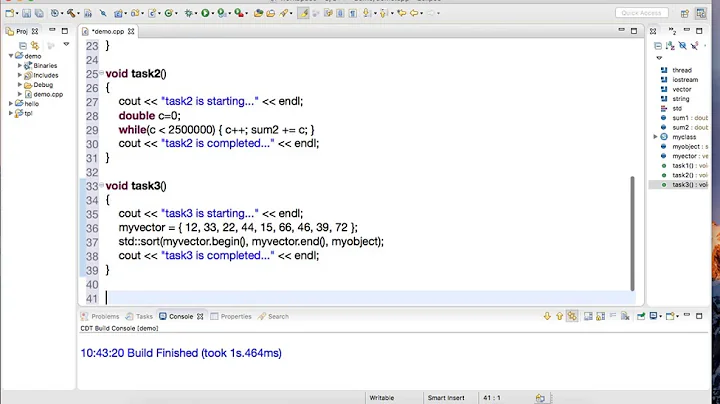Using stdlib's rand() from multiple threads
Solution 1
srand() seeds the random number generator. You should only have to call srand(time(NULL)) once during startup.
That said, the documentation states:
The function
rand()is not reentrant or thread-safe, since it uses hidden state that is modified on each call. This might just be the seed value to be used by the next call, or it might be something more elaborate. In order to get reproducible behaviour in a threaded application, this state must be made explicit. The functionrand_r()is supplied with a pointer to anunsigned int, to be used as state. This is a very small amount of state, so this function will be a weak pseudo-random generator. Trydrand48_r(3) instead.
The emphasized part of the above is probably the reason why all your threads get the same number.
Solution 2
As you are using C++, rather than C, you may be able to avoid the threading problems often associated with srand/rand by using c++11. This depends on using a recent compiler which supports these features. You would use a separate engine and distribution on each thread. The example acts like a dice.
#include <random>
#include <functional>
std::uniform_int_distribution<int> dice_distribution(1, 6);
std::mt19937 random_number_engine; // pseudorandom number generator
auto dice_roller = std::bind(dice_distribution, random_number_engine);
int random_roll = dice_roller(); // Generate one of the integers 1,2,3,4,5,6.
I referred to Wikipedia C++11 and Boost random when answering this question.
Solution 3
From the rand man page:
The function rand() is not reentrant or thread-safe, since it uses hidden state that is modified on each call.
So don't use it with threaded code. Use rand_r (or drand48_r if you're on linux/glibc). Seed each RNG with a different value (you could seed a first RNG in the main thread to produce random seeds for the ones in each thread).
Solution 4
If you are launching the threads all at the same time, the time sent to srand is probably the same for each thread. Since they all have the same seed, they all return the same sequence. Try using something else like a memory address from a local variable.
Solution 5
C was not designed for multithreading, so behavior of srand() with multithreading is not defined and depends on the C runtime library.
Many Unix/Linux C runtime libraries use single static state, which is not safe to access from multiple threads, so with these C runtimes you can't use srand() and rand() from multiple threads at all. Other Unix C runtimes may behave differently.
Visual C++ runtime uses per-thread internal state, so it is safe to call srand() for each thread. But as Neil pointed out, you will likely seed all threads with same value - so seed with (time + thread-id) instead.
Of course, for portability, use Random objects rather than rand function, and then you would not depend on hidden state at all. You still need one object per thread, and seeding each object with (time + thread-id) is still a good idea.
Related videos on Youtube
SIMEL
Updated on March 15, 2020Comments
-
SIMEL about 4 years
I have several threads which all run the same function. In each of these they generate a different random number several times. We tried to do this by putting
srand(time(0))at the start of the function, but it seems that they all get the same number.Do we need to call
srand(time(0))only once per program, i.e at the start ofmain(for example), at the start of each function that is called several times, or something else?-
fredoverflow almost 13 yearsYou are probably better off with the new random number generators coming in C++0x. What compiler are you using?
-
ob_dev almost 13 yearsWhat OS are you using windows/linux ??
-
ob_dev almost 13 yearsif all the treads use the same srand() you will get the same random numbers
-
Johan Råde almost 13 yearsDon't call rand() from multiple threads. Use the random number generators in C++0x. These are also available in Boost.
-
Paulo Carvalho almost 5 yearsI've observed that rand() starts over the same sequence everytime a thread starts. In my application I start one thread in a loop, and rand() repeated the same sequence in each iteration. rand() is definitely a no-no with multithreading. I fixed this by using those newer C++ generators like suggested above.
-
-
Seng Cheong over 8 yearsUsing the memory address of a local variable is not a good source of entropy.
-
AnT stands with Russia over 5 yearsIt is not clear how this very narrowly implementation-specific quote applies to the original question. The latter does not state what implementation is used.
rand()can easily be thread safe. It is up to a specific implementation. -
Groo over 3 yearsInterestingly,
randseems to be a thread-safe version ofrand_rin glibc, not vice-versa (if I am interpreting the source code correctly). -
borrrden over 3 yearsYou are not. You are looking at exactly the internal state that makes it non thread-safe.
-
omatai about 3 yearsI'm going to comment "windows" just so that people more readily land on this answer when using MS Visual C++ in a Windows context.
-
Nate Eldredge over 2 years@AnT: But
rand()is not required to be thread-safe, so a portable multi-threaded program cannot safely use it (except by protecting it with a mutex or similar). C17 7.22.2.1p3: "Therandfunction is not required to avoid data races with other calls to pseudo-random sequence generation functions [such as itself]".












